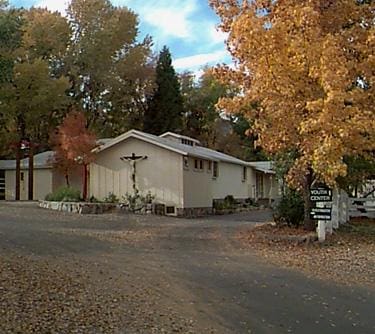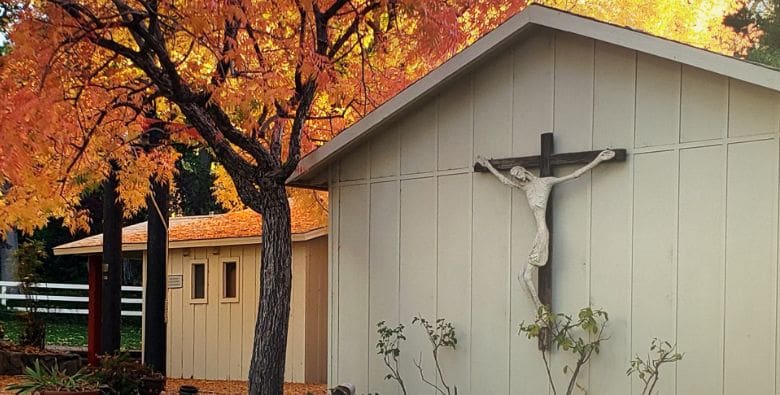A Homily by Abbot Francis Benedict, O.S.B.
 (Liturgical Readings: Isaiah 63: 7-9; Colossians 3:12-17; Luke 17:11-19)
(Liturgical Readings: Isaiah 63: 7-9; Colossians 3:12-17; Luke 17:11-19)
TODAY is the national day of Thanksgiving in the United States. Because of this, our Church has designated liturgical prayers and various readings to choose from which highlight the way people of Gospel faith can celebrate this as a national feast but as an expression of our faith as well. Throughout our land, people are sitting down at table together to enjoy one another’s company and to overindulge in rich and delicious fare. All this can build family unity and create memories to cherish throughout the coming year but our feasting must not eclipse the reason our forebears created this day, or others like it, to be a day of National Thanksgiving to God.
President George Washington in his 1789 Thanksgiving Proclamation stated his reason for recommending “to the people of the United States a day of public thanksgiving and prayer, to be a observed by acknowledging with grateful hearts the many and signal favors of Almighty God, especially by affording them an opportunity peaceably to establish a form of government for their safety and happiness.” He made this proclamation, acknowledging the conclusion of the war of independence, for the establishment of the nation, for the civil and religious liberties that had been established and blessed by God. In this day of Thanksgiving he asked the nation to pray that God “protect and guide all sovereigns and nations, to bless them with good governments, peace and concord; to promote knowledge and practice of true religion and virtue…and, generally to grant unto all mankind such a degree of temporal prosperity as he alone knows best.” It is quite interesting to note his particular concern for the well being of other nations, not just our own. If we are to enjoy peace and prosperity, other nations should also be enabled to enjoy the same and our nation’s prayers and efforts, our mind and heart, should encompass the needs and longings of all the nations for their own good.
President Abraham Lincoln in his 1863 Proclamation of Thanksgiving, reminded the citizens that “we are prone to forget the source from which they come (the bounties of fruitful field and healthful skies). Lincoln’s personal faith was in God more than in human striving when he further stated: “No human counsel hath devised nor hath any mortal hand worked out these great things. They are gracious gifts of the Most High God, who, while dealing with anger for our sins, hath nevertheless remembered mercy…And I recommend to them (the people of this nation…and now) that while offering up the ascriptions justly due to Him for such singular deliverances and blessings, they do also, with humble penitence for our national perverseness and disobedience, commend to His tender care all those who have become widows, orphans, mourners or sufferers in the lamentable civil strife in which we are unavoidably engaged (here he speaks of the Civil War), and fervently implore the interposition of the Almighty Hand to heal the wounds of the nation and to restore it as soon as may be consistent with the Divine purposes to the full enjoyment of peace, harmony, tranquility and Union.”
Our first reading from the Prophet Isaiah encourages us to recall the favors of the Lord and His glorious deeds because of all He has done for us. God’s favor is not based on what we have done but on His mercy and great kindness. But God’s expectation of us, as people in relationship with him, is that we be a people who remember Him, who reverence Him, who are loyal to Him. We acknowledge the God of the Hebrew covenant as the faithful God, the savior of His people in every affliction. God is the One who lifts his people and carries them, today as in the days of old.
As people of the new and everlasting covenant, we acknowledge not only the God of our salvation, but we acknowledge our privilege in faith and baptism to be called God’s chosen ones. Because of this privilege we are called to be—to become holy through the transformation of the Holy Spirit in such a way that our actions are reflections of Divine Grace. Our virtues are infused by Grace but grow within us through heartfelt compassion, kindness, humility, gentleness and patience. That means for us that we live together in full consciousness that we have been recipients of God’s mercy and must therefore, in gratitude and in remembrance, bear with one another and forgive one another as the Lord has forgiven us. St. Benedict would call this behavior an expression of the good zeal (RB 72) which monks ought to have in their dealings with God and with one other. But such zeal can be founded only upon the immensity of God’s love and the immensity of His compassion and not be regarded as the ability of any particular person, no matter how virtuous. We draw on Christ in this Eucharistic celebration to be the source of all good and the empowerment of all virtue within us, within our family or community, within our local civic community, the nation, or the world community.
It is the word of Christ in all its richness that can provide the wisdom within each of us and all of us as parts of the One Body to become peacemakers, men and women of prayer and of faith, of pure intention and of rightful action. We cannot acknowledge the God of every blessing if we do not at the same time acknowledge our own weaknesses, our unwillingness to forgive, our grudge bearing, our fear of the future, our blaming of others rather than ourselves—when it comes to the spiritual and social ills of our nation, our community, our family, and our person.
When we lift our hearts to God in thanksgiving, we do so as a humble chosen people. Our “singing psalms, hymns and inspired songs” as St. Paul exhorts us, is to elevate our minds and hearts to the God who deserves our all and our best, despite our human weakness. As members of one another, through every trial or darkness, God provides His wisdom and His direction through our life together. Our gratitude must pervade this day, not just a gratitude for the plenty of our feasting but for that greater bounty which is our communion with the living God, whether in feasting or in fasting.
Finally, the example of the grateful leper, that foreigner healed by the command of Jesus, is the reminder of that truth which we must keep before the eyes of our heart: God is to be loved and thanked and remembered always and at all times. It is the grateful heart that restores balance to the clouded mind, forgetful of God or the abiding mercy that upholds each one of us day by day. This mercy is nothing less that tender mercy and heartfelt compassion, experienced from God and within his Church, in its word and sacrament. In Christ, we become people of humility and people of remembrance, people of thanksgiving who share God’s blessings with those near and far, with those most in need, with those who seem not to want or to deserve our good intentions, even to our enemies, for whom Jesus reminds us to pray.
The Preface for this Thanksgiving Day, reminds us powerfully that the Hebrews of old and we ourselves have been liberated from bondage. We carry with us the promise that all people could be free and that all people would be blessed. Our faith in the Saving Lord Jesus Christ foreshadows a new freedom in the Spirit because of his saving death and resurrection. The vision of peace, which has been brought to the world by the Prince of Peace, is our gift and our call to become for this world what Jesus has been for us. So let embody the words of St. Paul, today and in the days to come: “Whatever you do, in word or in deed, do everything in the name of the Lord Jesus, giving thanks to God the Father through him.”


Send Us a
Prayer Request
Every day the monks include the petitions they receive when they pray the Liturgy of the Hours. Let us know how we can pray for you!